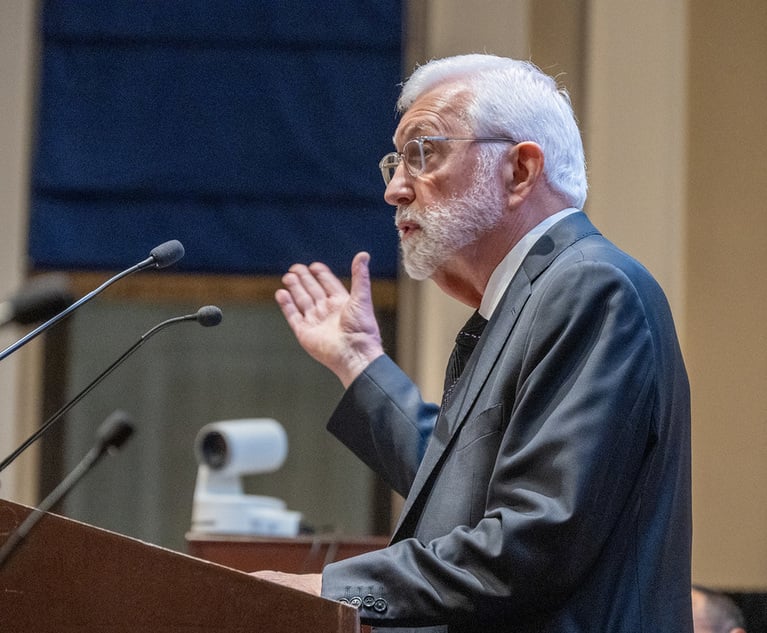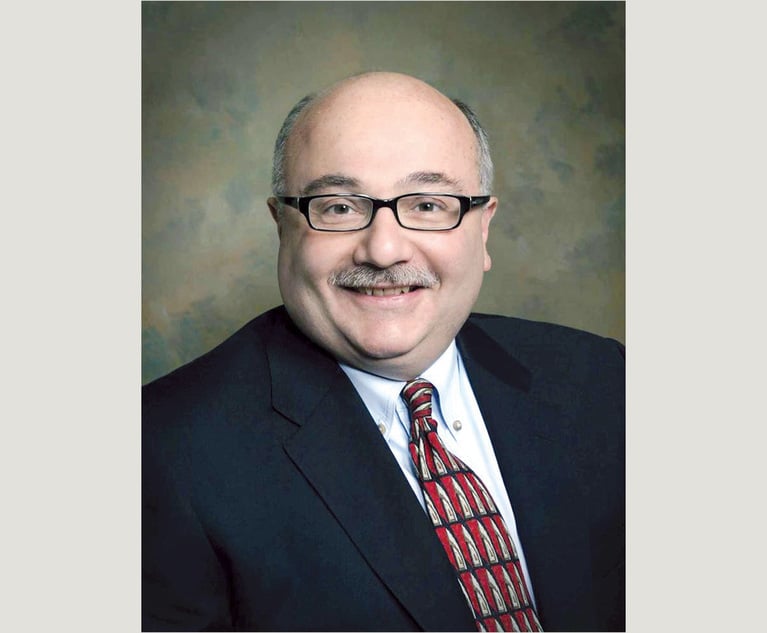Religious Accommodations: How Far Must Employers Go?
In Barry Black and Jonathan Robert Nelson's Religion Law column, the pair writes that there are limits to what employers must do to accommodate employees' bona fide religious beliefs.
August 29, 2018 at 11:05 AM
10 minute read
 Barry Black and Jonathan Robert Nelson
Barry Black and Jonathan Robert Nelson
Cory Chavis, a member of the Apostolic Pentecostal Church who observed the Sabbath on Sundays by, among other things, refraining from work, was employed as an asset protection manager (APM) at the Walmart store in Suffern, New York. For approximately six years, Chavis was able to arrange her schedule to avoid working on Sundays.
In March 2013, however, Walmart changed its policy to require APMs to work every third Sunday. Chavis requested an accommodation not to work on Sundays due to her religious observance. She said that her request was not granted and that she was told that she could use vacation days to avoid working on Sundays or find another position that did not require any Sunday work.
Chavis said that, for nearly six months, she used her vacation days to avoid working Sundays. In September 2013, Walmart exempted her from Sunday work and restored the vacation days she had used in the previous six months.
Chavis nevertheless sued Walmart under Title VII of the Civil Rights Act of 1964, asserting that Walmart had failed to accommodate her Sabbath observance for six months in 2013. Her complaint, and a decision issued by the U.S. District Court for the Southern District of New York in Chavis v. Wal-Mart Stores East, 265 F. Supp. 3d 391 (S.D.N.Y. 2017), which rejected her failure-to-accommodate claim because she had not suffered any discipline or adverse employment action as a result of her religious conflict, highlight the complex nature of employment-related religious accommodations disputes as well as the difficult issues facing employees with bona fide religious beliefs that conflict with their employment requirements—and the difficult issues facing their employers.
This column explores the law related to these kinds of religious accommodation claims and discusses the efforts that both employers and employees are expected to make in an effort to resolve them.
|Second Circuit Law
Religious accommodation law is relatively easy to recite, although significantly more complex to apply in practice. The U.S. Court of Appeals for the Second Circuit has held that when an employee has a genuine religious practice that conflicts with a requirement of employment, his or her employer, once notified, “must offer the aggrieved employee a reasonable accommodation, unless doing so would cause the employer to suffer an undue hardship,” as in Cosme v. Henderson, 287 F.3d 152, 158 (2d Cir. 2002). To make a prima facie case of failure to accommodate, a plaintiff must show that he or she held a bona fide religious belief conflicting with an employment requirement; informed the employer of this belief; and was disciplined for failure to comply with the conflicting employment requirement. See, e.g., Baker v. The Home Depot, 445 F.3d 541 (2d Cir. 2006).
If a plaintiff succeeds in establishing a prima facie case, the defendant only has to show that it offered the employee a reasonable accommodation, not necessarily the accommodation the employee preferred. The Second Circuit has explained that a reasonable accommodation is one that eliminated the conflict “between the employment requirement … and the employee's religious practice.”
|Full Accommodation
The Southern District's decision in Mereigh v. New York and Presbyterian Hospital, No. 16-cv-5583 (KBF) (S.D.N.Y. Nov. 9, 2017), illustrates how an employer can fully accommodate an employee's religious beliefs.
The plaintiff in this case, a self-professed Evangelical Christian who worked as a nurse for The New York and Presbyterian Hospital, raised a series of religious objections to performing work at a gynecological clinic at the hospital. For example, she objected to administering and providing education regarding contraceptives; answering clinical questions from medical assistants; and counting, ordering, or auditing certain abortion-related medications used by the clinic.
The court rejected the plaintiff's claim, finding that the hospital had provided the requisite reasonable accommodation as a matter of law. The court explained that the plaintiff was never required to provide any direct care to any patients at the clinic and was never required to administer or provide education regarding contraceptives in the clinic.
The court also pointed out that the hospital had instructed staff not to ask the plaintiff any clinical questions regarding the clinic, and that the staff had complied with that instruction. In addition, the hospital had informed the plaintiff that she did not have to count the medications herself and that she could assign the counting of the medications to another nurse.
In short, the court found, the hospital had “fully accommodated” the plaintiff's requests not to participate in the activities about which she had expressed a concern. The court concluded that the plaintiff had “never once” been required by the hospital to perform a single task that conflicted with her religious beliefs, and it granted summary judgment in favor of the hospital.
|A Failure to Accommodate
An employer that fully accommodates an employee's religious beliefs can expect to achieve the result reached in Mereigh, whereas one that does not might be more likely to face the consequences illustrated in Jamil v. Sessions, No. 14-CV-2355 (PKC) (RLM) (E.D.N.Y. March 6, 2017).
The plaintiff in this case, Liron Jamil, was an Orthodox Jew who refrained from working on the Jewish Sabbath (that is, the roughly 25-hour period lasting approximately from sunset Friday through one hour after sunset Saturday) as part of his faith. After he began working for the Bureau of Prisons (BOP) at the Metropolitan Detention Center (MDC) Brooklyn, Jamil sought permission to have “any/all work scheduling to be generated outside of the Sabbath time frame.”
Jamil said that he was told that he could try to alleviate his scheduling conflict by swapping shifts with other officers or putting in a request for leave without pay. His request to be permanently excused from Friday night and Saturday shifts was denied, however, “based on the effects that granting such a request would have on MDC Brooklyn,” including operational and financial effects and the “the effect on the morale of other employees.”
According to Jamil, he was able to swap several Friday shifts but was unable to find an officer willing to work his assigned Saturday shifts. When he was unable to find an officer willing to do a swift swap with him, Jamil requested leave without pay. Those requests were granted a number of times but, when they were denied, Jamil did not report to work and was marked “absent without leave” (AWOL).
Jamil resigned and sued the BOP, alleging that it had discriminated against him on the basis of his religion in violation of Title VII by failing to accommodate his reasonable request for a religious accommodation. Jamil asserted that he was “financially … burdened by not being able to work” the days that he was designated as AWOL, and that the “stress factors” of trying to get accommodations so that he could observe the Sabbath essentially forced him into resigning.
The BOP moved for summary judgment, but the district court denied its motion.
In its decision, the district court explained that the BOP had to demonstrate that it had offered Jamil a reasonable accommodation or that it had not done so because it would have caused the BOP to suffer an undue hardship. The district court added that a reasonable accommodation was one that eliminated “the conflict between employment requirements and religious practices.” The district court also pointed out that the process of finding a reasonable accommodation was “intended to be an interactive process” in which both the employer and employee participated. Although the employer had the burden of making a reasonable accommodation for the religious beliefs of an employee, “the employee, too, must make some effort to cooperate with an employer's attempt at accommodation.”
The district court then ruled that the BOP's proposed solution of shift swaps and taking unpaid leave—which left Jamil with nine days in three months in which he had to either show up to work or be marked AWOL, despite his efforts to swap shifts—did not “eliminate the conflict between the employment requirement and the religious practice.” The district court explained that although the BOP gave Jamil the option of shift swaps and authorized unpaid leave, as a practical matter, Jamil was not able to find enough officers to voluntarily trade with him for his Friday night and Saturday shifts, and he did not have enough seniority to bid on a schedule that would have accommodated his religious observance.
In the district court's view, it was “inevitable” that Jamil would have to not only take unpaid leave, but would have to be absent and designated AWOL for his assigned Saturday shifts. The district court concluded, therefore, that the BOP's proposed solution “was almost no accommodation at all.”
|Conclusion
Religious accommodation disputes can lead to claims under a variety of laws in addition to Title VII, including, for example, the New York State Human Rights Law (N.Y. Executive Law Section 296) and the New York City Human Rights Law (N.Y.C. Administrative Code Sections 8-101 et seq.). Plaintiffs in these cases also typically assert a broad range of claims, from hostile work environment and disparate treatment to retaliation, and different issues can arise when a case involves a collective bargaining agreement.
A religious accommodation lawsuit can hinge on not just an employer's proposed accommodation (or lack thereof), but also on the employee's conduct. For example, a religious accommodation claim was rejected earlier this year for an employee who sought to be excused from working overtime on Friday evenings and his employer offered to change his days off to Sunday and Monday. The court's rationale: The employee refused the proposed accommodation for “family” reasons, rather than for religious reasons. See, Moore v. City of New York, No. 15-CV-6600 (GBD) (JLC) (S.D.N.Y. July 20, 2018). In other lawsuits, the key factor in a case can be whether an employer is unable to offer a reasonable accommodation without undue hardship. See, e.g., Elmenayer v. ABF Freight Systems, No. 98-CV-4061 (E.D.N.Y. Sept. 20, 2001). Moreover, distinctions may exist when religious employers are involved. See, Barry Black and John B. Madden, “Exceptions and Exclusions Benefit Religious Institutions and Clergy,” NYLJ Sep. 13, 2017 (“Congress has exempted religious institutions such as churches, synagogues, and mosques from much of Title VII's prohibition against employment discrimination on the basis of religion.”).
The bottom line is that, in many instances, there is almost nothing more important to an employee than his or her religious beliefs. The law recognizes that, and requires that employers do so as well, within limits.
Barry Black is a partner in the religion law firm Nelson Madden Black, which serves the legal needs of religious institutions and individuals. Jonathan Robert Nelson is a partner at the firm. Resident in the firm's offices in Midtown Manhattan, they can be reached at [email protected] and [email protected], respectively.
This content has been archived. It is available through our partners, LexisNexis® and Bloomberg Law.
To view this content, please continue to their sites.
Not a Lexis Subscriber?
Subscribe Now
Not a Bloomberg Law Subscriber?
Subscribe Now
NOT FOR REPRINT
© 2024 ALM Global, LLC, All Rights Reserved. Request academic re-use from www.copyright.com. All other uses, submit a request to [email protected]. For more information visit Asset & Logo Licensing.
You Might Like
View All
Decision of the Day: Second Amendment Does Not Offer Right to Obtain Firearms 'On Demand'

Decision of the Day: Firm, Founding Partner Disqualified From Probate Case Amid Investigation on Undue Influence Claim

Decision of the Day: District Judge Vacates Magistrate's Ruling to Disqualify Prosecutors in Kidnapping Case

Labaton’s Eric Belfi on Running Case Investigation, Analysis and Delaware Presence
Trending Stories
- 1Judicial Ethics Opinion 24-81
- 2Mental Health Issues Don’t Get a Holiday
- 3'It's Got to Be a Wake-Up Call:' Atlanta Attorney Hopes $16M Verdict Spurs Training Changes at Hotels
- 4FTC Bans 'Junk Fees' in Live-Event Tickets and Short-Term Lodging
- 5California Legal Awards Moving to Mid-Summer Date in 2025, Adds New Categories
Who Got The Work
Michael G. Bongiorno, Andrew Scott Dulberg and Elizabeth E. Driscoll from Wilmer Cutler Pickering Hale and Dorr have stepped in to represent Symbotic Inc., an A.I.-enabled technology platform that focuses on increasing supply chain efficiency, and other defendants in a pending shareholder derivative lawsuit. The case, filed Oct. 2 in Massachusetts District Court by the Brown Law Firm on behalf of Stephen Austen, accuses certain officers and directors of misleading investors in regard to Symbotic's potential for margin growth by failing to disclose that the company was not equipped to timely deploy its systems or manage expenses through project delays. The case, assigned to U.S. District Judge Nathaniel M. Gorton, is 1:24-cv-12522, Austen v. Cohen et al.
Who Got The Work
Edmund Polubinski and Marie Killmond of Davis Polk & Wardwell have entered appearances for data platform software development company MongoDB and other defendants in a pending shareholder derivative lawsuit. The action, filed Oct. 7 in New York Southern District Court by the Brown Law Firm, accuses the company's directors and/or officers of falsely expressing confidence in the company’s restructuring of its sales incentive plan and downplaying the severity of decreases in its upfront commitments. The case is 1:24-cv-07594, Roy v. Ittycheria et al.
Who Got The Work
Amy O. Bruchs and Kurt F. Ellison of Michael Best & Friedrich have entered appearances for Epic Systems Corp. in a pending employment discrimination lawsuit. The suit was filed Sept. 7 in Wisconsin Western District Court by Levine Eisberner LLC and Siri & Glimstad on behalf of a project manager who claims that he was wrongfully terminated after applying for a religious exemption to the defendant's COVID-19 vaccine mandate. The case, assigned to U.S. Magistrate Judge Anita Marie Boor, is 3:24-cv-00630, Secker, Nathan v. Epic Systems Corporation.
Who Got The Work
David X. Sullivan, Thomas J. Finn and Gregory A. Hall from McCarter & English have entered appearances for Sunrun Installation Services in a pending civil rights lawsuit. The complaint was filed Sept. 4 in Connecticut District Court by attorney Robert M. Berke on behalf of former employee George Edward Steins, who was arrested and charged with employing an unregistered home improvement salesperson. The complaint alleges that had Sunrun informed the Connecticut Department of Consumer Protection that the plaintiff's employment had ended in 2017 and that he no longer held Sunrun's home improvement contractor license, he would not have been hit with charges, which were dismissed in May 2024. The case, assigned to U.S. District Judge Jeffrey A. Meyer, is 3:24-cv-01423, Steins v. Sunrun, Inc. et al.
Who Got The Work
Greenberg Traurig shareholder Joshua L. Raskin has entered an appearance for boohoo.com UK Ltd. in a pending patent infringement lawsuit. The suit, filed Sept. 3 in Texas Eastern District Court by Rozier Hardt McDonough on behalf of Alto Dynamics, asserts five patents related to an online shopping platform. The case, assigned to U.S. District Judge Rodney Gilstrap, is 2:24-cv-00719, Alto Dynamics, LLC v. boohoo.com UK Limited.
Featured Firms
Law Offices of Gary Martin Hays & Associates, P.C.
(470) 294-1674
Law Offices of Mark E. Salomone
(857) 444-6468
Smith & Hassler
(713) 739-1250






